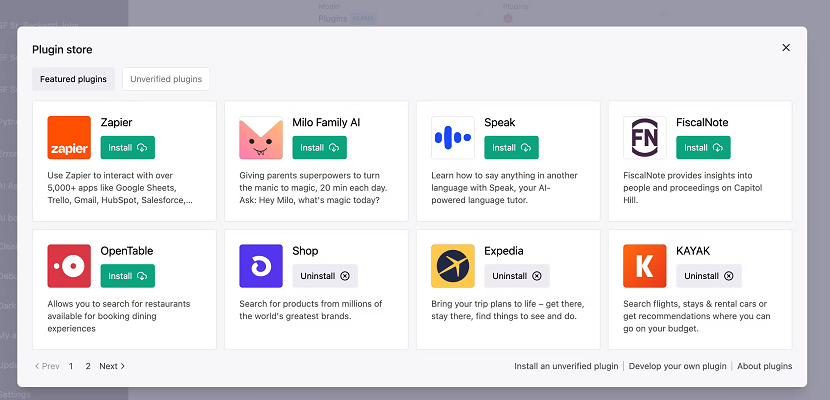New ChatGPT Plugins Link Present-Day Internet and Third-Party Apps to Generative AI Chatbot
OpenAI has added support for plugins to ChatGPT, transforming the generative AI chatbot into a platform capable of accessing and running native and third-party services and information, though only for ChatGPT Plus subscribers for now. The initial first-party plugins include a web browser based on the Microsoft Bing search API, bringing an end to ChatGPT’s late 2021 information cutoff.
Present Plugin
 ChatGPT’s web browsing plugin doesn’t change how the chatbot performs except that it will widen its search for information to be more up-to-date. The AI will gather data from online sources to compose answers and will include a list of links to its sources, as seen in the example on the side. OpenAI is trying to avoid some of the pitfalls associated with skimming information from the internet, The plugin is also limited to fetching information; it won’t carry out any transactions or submit forms. Website owners who don’t want ChatGPT to trawl their database can adjust their robots.txt file to forbid the AI from doing so. OpenAI’s other homegrown ChatGPT plugin is a code interpreter for Python that can be used for data analytics and visualization, as well as converting files to different formats.
ChatGPT’s web browsing plugin doesn’t change how the chatbot performs except that it will widen its search for information to be more up-to-date. The AI will gather data from online sources to compose answers and will include a list of links to its sources, as seen in the example on the side. OpenAI is trying to avoid some of the pitfalls associated with skimming information from the internet, The plugin is also limited to fetching information; it won’t carry out any transactions or submit forms. Website owners who don’t want ChatGPT to trawl their database can adjust their robots.txt file to forbid the AI from doing so. OpenAI’s other homegrown ChatGPT plugin is a code interpreter for Python that can be used for data analytics and visualization, as well as converting files to different formats.
“Motivated by past work, allowing language models to read information from the internet strictly expands the amount of content they can discuss, going beyond the training corpus to fresh information from the present day,” OpenAI explained in its announcement. “Browsing retrieves content from the web using the Bing search API. As a result, we inherit substantial work from Microsoft on (1) source reliability and truthfulness of information and (2) “safe-mode” to prevent the retrieval of problematic content. The plugin operates within an isolated service, so ChatGPT’s browsing activities are separated from the rest of our infrastructure.”
Third-Party Plugs
 The initial crop of third-party plugins for ChatGPT run a gamut of personal and professional services. The list includes Expedia, FiscalNote, Instacart, Kayak, Klarna, Milo, OpenTable, Shopify, Slack, Speak, Wolfram, and Zapier. Each is designed to perform like ChatGPT is a human assistant carrying out a user’s requests by going to the sundry websites for information and then forwarding along details and helpful links. As seen in the video up top, OpenTable’s plugin will look for restaurants and find openings for reservations, Instcart’s plugin can order groceries, Kayak and Expedia help make travel plans, and Zapier coordinates with productive apps like Gmail and Google Sheets.
The initial crop of third-party plugins for ChatGPT run a gamut of personal and professional services. The list includes Expedia, FiscalNote, Instacart, Kayak, Klarna, Milo, OpenTable, Shopify, Slack, Speak, Wolfram, and Zapier. Each is designed to perform like ChatGPT is a human assistant carrying out a user’s requests by going to the sundry websites for information and then forwarding along details and helpful links. As seen in the video up top, OpenTable’s plugin will look for restaurants and find openings for reservations, Instcart’s plugin can order groceries, Kayak and Expedia help make travel plans, and Zapier coordinates with productive apps like Gmail and Google Sheets.
“Users have been asking for plugins since we launched ChatGPT (and many developers are experimenting with similar ideas) because they unlock a vast range of possible use cases,” OpenAI wrote. “Though not a perfect analogy, plugins can be “eyes and ears” for language models, giving them access to information that is too recent, too personal, or too specific to be included in the training data. In response to a user’s explicit request, plugins can also enable language models to perform safe, constrained actions on their behalf, increasing the usefulness of the system overall.”
Follow @voicebotaiFollow @erichschwartz
Microsoft 365 Copilot Infuses Generative AI Into Every Office App
OpenAI Debuts GPT-4 Multi-Modal Generative AI Model With a Sense of Humor
Salesforce and OpenAI Bring ChatGPT to Slack, Resurrect Einstein With Generative AI









